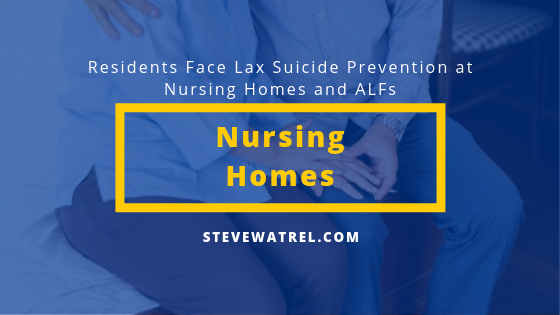September is Suicide Awareness and Prevention Month. Seniors have a higher suicide risk than most other age groups, and suicides at nursing homes and assisted living facilities is a growing problem in the industry. This trend is alarming because families expect the staff of a facility to notice if the residents were developing mental health issues, or at the very least, monitor them enough to make suicide attempts unlikely to succeed. Unfortunately, recent studies have suggested that residents face lax suicide prevention at nursing homes and ALFs.
A six-month investigation by Kaiser Health News and PBS NewsHour released in 2019 found that “older Americans are quietly killing themselves in nursing homes, assisted living centers and adult care homes.” Though official totals are hard to come by, so the team used data from the University of Michigan. Their research suggests that there hundreds of suicides from seniors in care facilities every day.
Many factors influence suicide attempts, but whatever the reason, nursing home staff members, have a responsibility to protect their residents from self-harm. The KHN study found many elder suicide cases happened because the staff failed to heed suicidal warning signs or evicted patients who tried to kill themselves.
In Florida, nursing home staff members are required to contact adult protective services in situations where a suicide prevention intervention is necessary. To not provide for the mental well-being of their residents could qualify as adult neglect by the legal standards in Florida. “Neglect” can mean any situation where the staff ignores conduct or behavior that could reasonably be expected to result in serious physical or psychological injury or a substantial risk of death. Self-harm is the kind of conduct that nursing home staff members must be working to prevent.
Family members have their own role to play in preventing depression and suicide among the older loved ones. Feeling isolated increase the suicide risk for seniors, and that can be exacerbated by being moved to a nursing home. By regularly communicating and visiting elderly family members in managed care, these feelings of isolation can be avoided. It also helps the senior acclimate to their new environment.
If a nursing home or assisted living facility fails to care for a suicidal resident properly, the facility could be sued for wrongful death. Not all elder suicides in managed care are considered elder abuse by the state. Filing a wrongful death case can help families of nursing home residents keep facilities more interested in providing proper mental health care in the future. Even if the nursing home faces no criminal charges, they could be successfully sued for wrongful death. The threat of these penalties will encourage the facility to train their staff and to take swifter action to prevent elder suicides.
If you lost a loved one in a nursing home due to suicide, talk to the Law Firm of Steve Watrel, P.A. to learn if the nursing home’s negligence is what made the situation possible. And remember to give your older loved ones the attention they deserve, so they don’t feel isolated or forgotten.




